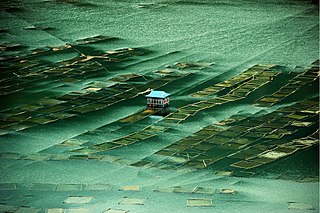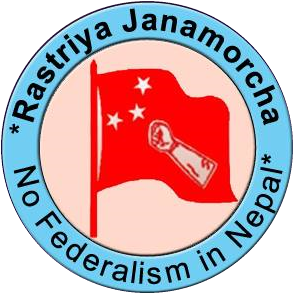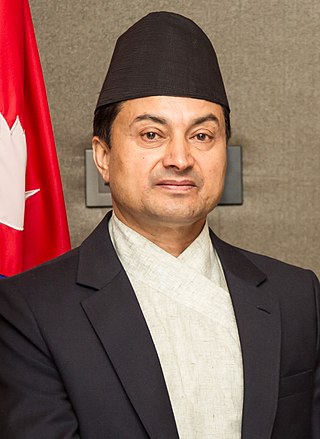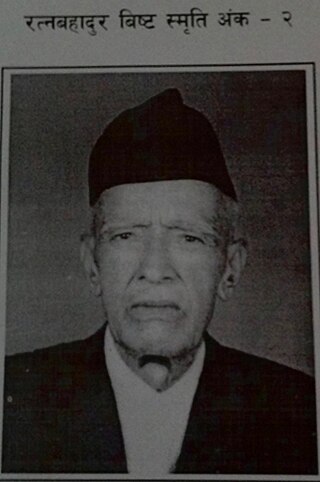
The Magars, also spelled Mangar and Mongar, are a Tibeto-Burman ethnic group native to Nepal and Northeast India, representing 6.9% of Nepal's total population according to the 2021 Nepal census. They are one of the main Gurkha tribes.

Khas peoples or Khas Tribes, popularly known as Khashya are an Indo-Aryan ethno-linguistic group native to the Himalayan region of the Indian subcontinent, in what is now the South Asian country of Nepal, as well as the Indian states of Uttarakhand, Himachal Pradesh, West Bengal, Assam and Sikkim. Khas consists of many subtribes like Kshetri, Thakuri, Bahun, khas dalit and Sanyasis and all spread across the Himalayas.

Chhetri, historically called Kshettriya or Kshetriya or Khas are Nepali speaking Rajputs historically associated with the warrior class and administration, some of whom trace their origin to migration from medieval India. Chhetri was a caste of administrators, governors, warriors and military elites in the medieval Khas Kingdom and Gorkha Kingdom. The nobility of the Gorkha Kingdom mainly originated from Chhetri families. They also had a strong presence in civil administration affairs. The bulk of prime ministers of Nepal before the democratization of Nepal belonged to this caste as a result of the old Gorkhali aristocracy. Gorkha-based aristocratic Chhetri families included the Pande dynasty, the Basnyat dynasty, the Kunwar family and the Thapa dynasty.

Makwanpur District, in Bagmati Province, earlier a part of Narayani Zone, is one of the seventy-seven districts of Nepal. The city of Hetauda serves as the district headquarters and also as the provincial headquarters. The district covers an area of 2,426 km2 (937 sq mi) and had a population of 392,604 in 2001 and 420,477 in 2011. The latest census of 2021 recorded the population of Makwanpur as 466,073.
Ram Bahadur Bista is a Nepalese politician. He was elected to the Pratinidhi Sabha in the 1999 election on behalf of the Nepali Congress. Bista was the Nepali Congress candidate in the Achham-2 constituency for the 2008 Constituent Assembly election.
Pampha Bhusal is a Nepali politician. She has served as an elected member of parliament and the constitutional assembly as well as a minister several times. She was the second woman to lead a political party in Nepal after Sahana Pradhan; she was the leader of the United Peoples’ Front c. 1994. On 13 July 2021 she became Minister for Energy, Water Resources and Irrigation in the newly formed cabinet under Prime Minister Sher Bahadur Deuba.

Rastriya Janamorcha is a political party in Nepal. It was originally founded in 1995 as the legal front of Communist Party of Nepal (Masal). Former Deputy Prime Minister, Chitra Bahdur KC is the chairman of the party.

Deepak Bista is a male Nepalese taekwondo former player and practitioner. One of the most popular and highly popular sportsperson in Nepal, he competed at the 2008 Summer Olympics. On August 8, 2008 at the opening ceremony of the Beijing Olympics, Bista was the flagbearer for Nepal.

Dor Bahadur Bista is a Nepalese anthropologist, social scientist and activist. Bista is considered the Father of Nepali anthropology, and has published popular books such as Fatalism and Development and People of Nepal. Bista mysteriously disappeared in 1995.

People of Nepal is a 1967 book by Dor Bahadur Bista. The book is the first relatively comprehensive view of the vast array of Nepalese cultures, castes and ethnic groups, with descriptions of their unique customs. It is written by anthropologist Dor Bahadur Bista.
Bista is a family name of people of North Indian Hills and Nepal belonging to Khas people group under the caste Chhetri, sub-groups of the Bahun caste. They are Hindu with a local Masto deity.

Nepal Literature Festival is an annual international literary festival which takes place in Pokhara, Nepal. It was founded in 2011 by Bookworm Foundation, a not-for-profit organization.

Gokarna Bista is a Nepalese politician and former secretary of Communist Party of Nepal (UML). He served as Minister of Energy under prime minister Jhala Nath Khanal and as Minister of Labour, Employment and Social Security in the KP Oli-led cabinet. He was elected in the 2013 Nepalese Constituent Assembly election from Gulmi district constituency number 3. In April 2011, during his tenure as the minister of energy, he was stabbed by two motorcyclists outside his house. He became popular for revolutionary changes in the power sector of Nepal.

The Minister of Finance(or simply, the FinanceMinister, is the head of the Ministry of Finance of the Government of Nepal. One of the senior-most officers in the Federal Cabinet, the finance minister is responsible for the fiscal policy of the government. A key duty of the Finance Minister is to present the annual federal budget in Parliament, detailing the government's plan for taxation and spending in the coming financial year. Through the Budget, the finance minister also outlines allocations to all the ministries and departments. The Minister is assisted by the Minister of State for Finance and the junior Deputy Minister of Finance.
Maina Kumari Bhandari is a Nepali communist politician and a member of the House of Representatives of the federal parliament of Nepal.

Ratna Bahadur Bista (1910–1990) was the fifth Chief Justice of Nepal. He was born in Dadeldhura to an aristocratic family that was given land grants in Sudurpashchim Province circa 1911 during a hunting trip by King George V of the United Kingdom and Chandra Shumsher Jang Bahadur Rana, the Prime Minister of the Rana Dynasty. He went on to become the 5th Chief Justice of Nepal, in office from 26 July 1970 to 6 August 1976. He was appointed by the then-king of Nepal, Mahendra. He was responsible for the Summary Procedure Act 1971. The Committee that he established recommended for the establishment of High Courts in different regions which resulted in the creation of a four tiered judicial structure with one additional tier in the middle- "the Regional Courts."
KC is a surname of medieval Indian origin anglicized as an abbreviation of Khatri Chhetri in Nepal. The surname Khatri Chhetri was historically legally labelled to the children of Brahmin fathers and Kshatriya (Chhetri) mothers after the introduction of Muluki Ain in 1854 by Jang Bahadur Rana of Nepal. With its origin in the 12th century CE, the archaic form of the surname "Khatri" was ascribed as a local endonym for the progeny of Brahmins from Medieval India and Khas women of the Middle Himalayas in medieval western Nepal.

Madan Bahadur Hari Bahadur was a Nepali sitcom television series. Hari Bansha Acharya and Madan Krishna Shrestha were the script writer, director, and the main characters. The show aired on Nepal Television. Integrating political and social topics into a comedy drama, Madan Bahadur Hari Bahadur was one of the most viewed programs in Nepal. The series ended in 2010. Hari Bahadur's character is very popular and widely loved among Nepali people, it is considered one of the funniest in the country's entertainment industry. Other comedians frequently imitate this character on their shows.
Mahendra Bahadur Bista is a Nepali politician and scientist. He has held the position of director general of the government's Department of Health (DOH) and the director of Nepal's Epidemiological and Disease Control Division position implementing modern maternity care and disease control in rural parts of the country. He is the nephew of Ratna Bahadur Bista.
The first Karnali Provincial Assembly was elected by the 2017 provincial elections. 40 members were elected to the assembly, 24 of whom were elected through direct elections and 16 of whom were elected through the party list proportional representation system. The term of the assembly started on 4 February 2018 and ended in September 2022. Mahendra Bahadur Shahi from the CPN and Jeevan Bahadur Shahi from the Nepali Congress served as chief ministers during the term of the assembly. Raj Bahadur Shahi served as the speaker of the assembly and Pushpa Bahadur Gharti served as the deputy speaker.













